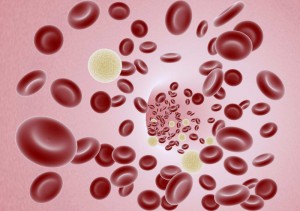 Ten percent of all cancer cases are classified as blood cancers because they originate in the blood, bone marrow, or lymphatic tissue that frequently spreads to bone marrow. These cancers, which include leukemia, lymphoma, and myeloma, cause uncontrolled division and growth of abnormal blood cells that can crowd out other necessary blood cells. While they can affect people of all ages, lymphomas are the third most common cancers in children.
Ten percent of all cancer cases are classified as blood cancers because they originate in the blood, bone marrow, or lymphatic tissue that frequently spreads to bone marrow. These cancers, which include leukemia, lymphoma, and myeloma, cause uncontrolled division and growth of abnormal blood cells that can crowd out other necessary blood cells. While they can affect people of all ages, lymphomas are the third most common cancers in children.
One of the greatest problems with these cancers is diagnosis. The typical symptoms of blood born cancers are also common in many non-life threatening illnesses and, as such, can delay accurate diagnoses. These include generalized tiredness, anemia, bone aches, or bruising. Many blood cells are involved in the immune response and may be reduced in patients, who may also experience frequent infections.
The most common treatments for leukemia, lymphoma, and myeloma are chemotherapy and radiation, which have significantly increased survival rates over the last decades. Remission for these cancers is positively correlated with the amount of chemotherapy used, meaning that the greater the chemotherapy dose, the more likely the cancer cells will be destroyed. Unfortunately, increased chemotherapy also increases the risk for future infertility.
Patients at high risk for relapse or those not responding to traditional cancer therapies are candidates for stem cell transplantation. During a stem cell transplant, cancer-free cells are introduced into a patient and become integrated into bone marrow cavities to begin making healthy bone marrow and stem cells. Stem cell transplants can be used with cells from the patient, called an autologous transplant, or from cells from a donor, called an allogenic transplant. Prior to transplantation, patients undergo significant chemotherapy and whole body irradiation to kill off any remaining cancer cells and inhibit the patient’s immune system to prevent rejection of donor cells. The significant amount of chemotherapy and radiation in stem cell transplantation put patients especially at risk for loosing their fertility and such patients should look into fertility preservation options if they are interested in having biological children later in life.
Fortunately, both oncology providers and patients have many opportunities to learn more about emerging research and treatments in blood born diseases. Last Friday, the Physicians’ Education Resources hosted an event at Northwestern University’s Feinberg School of Medicine to inform providers on “Current Trends in Leukemia, Lymphoma, and Myeloma.” Patients and their families can also learn from the experts in a series of free upcoming events for the public including the Leukemia Research Foundation’s Annual Town Hall Meeting on Sunday, January 30, 2011, which will include physician panelists who will discuss how to find a treatment center, the role of genetics in blood cancers, and clinical trials for patients. Gilda’s Club of Chicago is also holding a seminar on February 2, 2011, on Improving Treatments for Blood Cancers.

